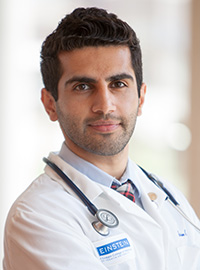

Hope through Healthcare
Samim Atmar: A Long Journey, a Familiar Destination
While many Einstein students take distinctive roads to their medical education, for third-year medical student Samim (Suh-meem) Atmar, the road has been particularly long and difficult – and ultimately, may return him where he started.
Born in Kabul, Afghanistan, at a time when the country was rocked by civil war, Mr. Atmar became a refugee at the age of three. "No one chooses a life as a refugee," he said. "We'd had a very good life, a middle-class life. But after a neighbor's daughter was killed by a rocket, my parents decided to seek asylum in Islamabad, Pakistan."

Samim Atmar, third-year medical student"I remember spending nights in a pitch-dark bomb shelter in Kabul, as my parents devised a plan to escape," he continued.
The relative safety of Pakistan was short-lived, however. In just weeks, the young Samim fell ill with malaria and typhoid fever, and was near death. Without money or access to healthcare, his family was forced to go back to Kabul to get him treatment.
The family eventually returned to Pakistan, where they lived during most of the 1990s. Although he found some common bonds with other Afghan refugees in Islamabad, Mr. Atmar recalled the environment being far from welcoming. "We knew we weren't invited," he said. "Violence and the threat of violence were everywhere. Afghans were often targets. My father was frequently harassed, and even arrested."
With little other choice, Samim and his family had to make do in their displaced setting.
That all changed in 1998, when Mr. Atmar's mother received a "once in a lifetime opportunity" to travel to the United States to attend a United Nations conference. She sought asylum and immediately began the process of sponsoring the rest of the family. By spring of 2001, Mr. Atmar found himself a refugee once again, attending middle school in northern Virginia, nearly 7,000 miles from his homeland.
Then 9/11 happened. As a result, he experienced the reality of racial profiling firsthand.
"It was a harsh experience, and very discouraging. I remember thinking, 'this is not what I thought the U.S. would be.'"
But there were some bright spots. As the United States began to wage war in already war-weary Afghanistan, a classmate approached Mr. Atmar one day and simply said, "I'm very sorry about what is happening in your country."
Recalling that incident, Mr. Atmar said, "I found it uplifting. I realized then that it was possible to look past differences that separate cultures and countries."
At the same time, Mr. Atmar began to thrive academically in his adopted country. As an eighth-grader, he was selected to participate in George Mason University's Early Identification Program, a pre-college program for middle- and high-school students who show academic promise.
Gradually, he experienced something he hadn't expected: hope.
"I've lived the life of a refugee, and so I think I can understand the lack of hope and the feeling of isolation that comes with it," he said. "Now I want to give something back to people living that life – not just with money, but with my time and energy."
Mr. Atmar is planning to concentrate in emergency medicine. "I feel it's the specialty that will provide me with the best skill-set for serving refugee communities."
He credits Einstein's emphasis on global health and community service as good preparation for that mission. For example, he has taught health education classes at a homeless drop-in center through the Homeless Outreach Program at Einstein (HOPE).
"HOPE has been one of my most rewarding experiences at Einstein," he said. "It was truly inspiring to teach homeless clients about common health obstacles faced by the community. Their struggles in attaining healthcare were reminiscent of life as a refugee, and it provided me invaluable experiences that will inform my work in the future."
Giving back seems to come naturally to Mr. Atmar. Years after participating in the EIP, he returned to the program as a George Mason undergraduate, volunteering as a tutor and counselor.
"Samim's assistance was invaluable, and he earned great respect among the students and the staff for his dedication," said the EIP's former director, Hortensia Cadenas.
But Mr. Atmar is modest about such praise. For him, service to others – whether in the Bronx, in Virginia or in a refugee camp halfway around the world – is a matter of choice.
"As a refugee, I didn't realize there were possibilities and choices for me. After I came to the U.S., my eyes were opened," he said. "I've learned that being able to choose how you affect the world is an essential part of our humanity."
Posted on: Tuesday, July 23, 2013

Tablet Blog